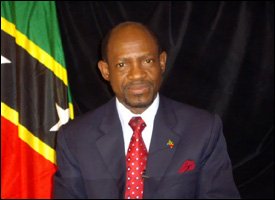
St. Kitts – Nevis Prime Minister – Dr. Denzil Douglas
Photo By Erasmus Williams
Basseterre, St. Kitts – Nevis
Septemeber 08, 2009
Opening Of The Saddlers Secondary School
With the new academic year commencing today September 7, the new modern Saddlers Secondary School opened its door for the first time. The school day started with an opening ceremony with presentations made by the Hon. Prime Minister and Parliamentary Representative for the area ““ Dr Denzil Douglas, the Hon. Deputy Prime Minister and Minister of Education ““ Sam Condor, Education officials, and the new Principal of the School Mr. Stanley Knight. The new Deputy Principal Ms Adina Richards chaired the proceedings.
At the cabinet meeting which commenced after the conclusion of the opening ceremony, Prime Minister Douglas expressed pride in seeing a dream come true for and a promised delivered to the people of Saddlers and the surrounding areas. He highlighted the fact that the new school will use state of the art technology and teaching techniques and that it will be used as a model to guide the improvement of the entire education system in the Federation.
The Hon. Prime Minister was congratulated by his colleagues for a job well-done.
Corporatization Of The Electricty Department
In its quest to develop a diversified, reliable, more efficient, reasonably priced and more environmentally friendly electricity sector in the Federation, the Government set out to convert the Electricity Department into a statutory corporation. Phase I of the project, recently completed, involved the review of the records and all relevant reports of the Electricity Department, and the conduct of a number of surveys and analyses to yield the requisite background information that would be relevant in the phase II decision-making process.
At today’s cabinet meeting, Dr Hon. Earl Asim Martin, Minister of Public Utilities, gave a comprehensive overview of phase I of the corporatization project and outlined the major requirements of Phase II. Minister Martin advised the cabinet that in order to develop an energy sector that involves public sector working with private energy partners, it is mandatory that a new model of management be ushered in.
With the prospect of cheaper wind and geothermal energy, both sources currently under active exploration, Dr Martin projected that the cost of generating electricity should be lower in the future if we achieve at least a significant mix of renewable energy, and that the envisaged new electricity corporation will have to work out a new tariff structure to reflect that reality.
Phase II of the Corporatisation project which must be approved by cabinet before full implementation, possesses the following components, among others:
“¢ designing an appropriate organizational structure for the corporation
“¢ appointing a Board of Directors
“¢ appointing senior managers
“¢ transferring Electricity Department Staff to the new corporation
“¢ upgrading financial and human resource management systems
“¢ enacting legislation to create the new corporate entity and the signing of Power Purchase Agreements with wind and geothermal energy producers
Dr Martin assured Cabinet that lower electricity rates will help improve the lives of thousands of citizens and will create an environment for greater investment in all sectors of the economy.
Construction Sector Incentives
In recent times, business operators in various sectors of the economy have benefited from a range of incentive packages offered by the government to help stimulate the economy and to promote successful local businesses. Recently, restaurant operators were provided with an incentive package for improving their restaurants’ physical structure and menu.
On almost a weekly basis, cabinet approves tax concessions for a range of small local businesses. This facility is important but even more so at this time of global economic downturn.
At today’s cabinet, a new package of incentives for building contractors was approved. The package will allow building contractors to import a list of equipment critical to improving the quality and efficiency of the building process into the country with concessionary tax rates.
It is estimated that this new package will reduce labour cost on construction projects by as much as 8% and will help catalyze home ownership, the growth of the construction sector, employment and overall economic growth. Once again, the government is proud to offer to the local small business community a helping hand in these tough economic times.
The Public Works Department and the Building Board have been tasked with developing an objective set of criteria for approving contractors that will benefit under this project.
Radio Station License
Deputy Prime Minister and Minister of Technology, the Hon. Sam Condor made submission to the Cabinet recommending the issuance of one FM Radio Station Licence to a local business entity. Cabinet approved the submission recognizing the crucial importance of the media in promoting ideas, fomenting debate and discussion, and disseminating information, all necessary in creating a well-informed and more rational democratic society.
Since taking office in 1995, the current administration has issued more than ten (10) licences for the operation of radio stations and the publication of newspapers. This is a record of which cabinet was extremely proud to reflect upon and to which the free open, unfettered debate in our modern society can now be largely attributed.
Minister Condor revealed that he was to shortly bring for the approval of Cabinet another recommendation for the issuance of a radio station licence. Members of the public are asked to note that the National Telecommunications Regulatory Commission (NTRC) is responsible for evaluating all applications for radio station licences and for making recommendations to the Minister of Technology for their final approval.